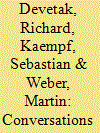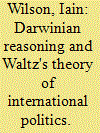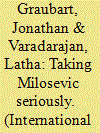|
|
|
Sort Order |
|
|
|
Items / Page
|
|
|
|
|
|
|
| Srl | Item |
| 1 |
ID:
127015


|
|
|
|
|
| Publication |
2013.
|
| Summary/Abstract |
This in-depth conversation with Professor Andrew Linklater engages with his academic biography, his intellectual contribution to the field of International Relations (IR) and his reflections on the current state of, and challenges facing, the discipline of (IR). It thereby traces his biography from his undergraduate days in Aberdeen, via his first lectureships in Australia, back to the United Kingdom and eventually to Aberystwyth University; it engages with his main oeuvres from the 1982 book Men and Citizens in the Theory of International Relations to his most recent work on The Problem of Harm in World Politics, and covers the development of IR as a global discipline from the 1970s until today.
|
|
|
|
|
|
|
|
|
|
|
|
|
|
|
|
| 2 |
ID:
127002


|
|
|
|
|
| Publication |
2013.
|
| Summary/Abstract |
There are important parallels between the pattern of inference Kenneth Waltz uses in his Theory of International Politics and early Darwinian reasoning. This early Darwinian thinking has needed to be significantly refined by modern evolutionary biologists, and their amendments are equally relevant to Waltz's model. Waltz allows for states to imitate each other and also accepts that they are only rarely eliminated from the system. Modern Darwinian analyses show that where elimination is rare and imitation is common, it is quite possible for deleterious behaviours to become widespread. We cannot assume an anarchic system will select for security-enhancing behaviours in major powers. Thinking about Waltz's argument in these terms opens space to disagree with his conclusions while respecting the strength of his logic.
|
|
|
|
|
|
|
|
|
|
|
|
|
|
|
|
| 3 |
ID:
127010


|
|
|
|
|
| Publication |
2013.
|
| Summary/Abstract |
Notwithstanding his premature death, the trial of Slobodan Milosevic is widely hailed as a landmark moment in the development of international criminal law. To many, the trial, in conjunction with the broader record of the International Criminal Tribunal for the former Yugoslavia (ICTY), represents the beginning of a new era of global justice characterized by the impending triumph of law over politics. This article dissents from the prevailing consensus by emphasizing the enduring role of imperialist relations in shaping international relations. Without defending Milosevic, we provide a critical reassessment of the ICTY's most celebrated trial. We do so to reveal the manner in which seemingly progressive legal institutions - far from furthering an abstract notion of justice - serve to re-inscribe a violent and highly unequal post-Cold War imperialist world order. Because the ICTY is far from a sui generis experience, we argue that it is critical to take Milosevic seriously in making sense of the nature and implications of global tribunals.
|
|
|
|
|
|
|
|
|
|
|
|
|
|
|
|
| 4 |
ID:
127013


|
|
|
|
|
| Publication |
2013.
|
| Summary/Abstract |
This article examines and critiques the binary structure of contemporary just war thinking. Theorists claim that the waging of war, and the committing of military acts within war, is either just or unjust. This binary distinction should be tempered by the awareness that justified wars are tragic: tragic in the broad sense of inescapably involving moral wronging, but not necessarily tragic in the narrow sense of not having been preventable by the tragic agent himself or herself. Justified war situations that fail to be tragic in the narrow sense are inauthentic. If contemporary just war theorists were to explicitly recognise the tragedy of justified war in the broad sense, as well as the dangers of lacking authenticity, their theory might become less susceptible to abuse by political moralists.
|
|
|
|
|
|
|
|
|
|
|
|
|
|
|
|
| 5 |
ID:
126996


|
|
|
|
|
| Publication |
2013.
|
| Summary/Abstract |
Scholars of politics, not just international relations, have eschewed the discipline of psychoanalysis. The renewed attacks on Freud and his fractious followers over the last generation apparently discouraged political scientists from exploring the usefulness of psychoanalytic methods. This essay asks whether, and under what circumstances, psychoanalysis can be a useful interpretive approach. What is the significance in human behavior of the unconscious, that is, of motives and forces of which we are commonly unaware? The argument is that in most, if not all, cases, psychoanalytically attuned approaches yield important insights about the wielding of power.
|
|
|
|
|
|
|
|
|
|
|
|
|
|
|
|
|
|
|
|
|